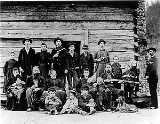
Hatfield-McCoy feud
Overview
West Virginia
West Virginia is a state in the Appalachian and Southeastern regions of the United States, bordered by Virginia to the southeast, Kentucky to the southwest, Ohio to the northwest, Pennsylvania to the northeast and Maryland to the east...
–Kentucky
Kentucky
The Commonwealth of Kentucky is a state located in the East Central United States of America. As classified by the United States Census Bureau, Kentucky is a Southern state, more specifically in the East South Central region. Kentucky is one of four U.S. states constituted as a commonwealth...
back country along the Tug Fork, off the Big Sandy River. The Hatfields of West Virginia were led by William Anderson "Devil Anse" Hatfield
Devil Anse Hatfield
William Anderson "Devil Anse" Hatfield was the patriarch of the Hatfield clan in the infamous Hatfield–McCoy feud which has since formed a part of American folklore. Devil Anse himself survived the feud, and agreed to end the feud in 1891.Hatfield was born in Logan, West Virginia, the son of...
while the McCoys of Kentucky under the leadership of Randolph "Ole Ran'l" McCoy
Randolph McCoy
Randolph "Ole Ran'l" McCoy was an American pioneer and the patriarch of the McCoy clan involved in the infamous American Hatfield–McCoy feud. His nemesis was Devil Anse Hatfield.-References:...
. Those involved in the feud descended from Ephraim Hatfield (born c. 1765) and William McCoy (born c. 1750). The feud has entered the American folklore
Folklore
Folklore consists of legends, music, oral history, proverbs, jokes, popular beliefs, fairy tales and customs that are the traditions of a culture, subculture, or group. It is also the set of practices through which those expressive genres are shared. The study of folklore is sometimes called...
lexicon as a metaphor for any bitterly feud
Feud
A feud , referred to in more extreme cases as a blood feud, vendetta, faida, or private war, is a long-running argument or fight between parties—often groups of people, especially families or clans. Feuds begin because one party perceives itself to have been attacked, insulted or wronged by another...
ing rival parties.

